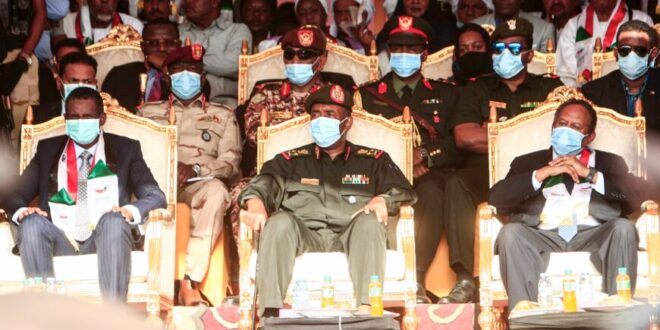Following a 10-year hiatus, since the secession of South Sudan on July 9, 2011, the governments in Juba and Khartoum agreed to resume trade activity and cooperate on transport and security beginning in early October.
As part of efforts to bolster peace between Sudan and South Sudan, the two governments last month signed a series of agreements on resuming trade and increasing cooperation in transportation and security.
The signing came during a three-day visit by Sudan’s Prime Minister Abdalla Hamdok to Juba on Aug. 21, during which he met with South Sudanese President Salva Kiir and other officials. Hamdok led a delegation including the ministers of defense, trade, transportation and foreign affairs, in addition to a number of senior officials from Khartoum.
Prior to the South Sudanese secession in 2011, many basic commodities used to be transported from the northern to the southern parts of the same country. Sudanese economist Mohamed al-Nayer told Al-Monitor the situation is different now. Had the two countries started trade exchange immediately after the secession 10 years ago, significant economic growth would have been achieved in the two countries if also based on sound foundations, he said, expecting the volume of trade exchange between the two countries to exceed $2 billion per year.
Nayer said the next steps include opening branches of Sudanese banks on the borderline and in areas between the two countries to ensure the revenues from the imports and exports are included in the trade balance between the two countries.
Nayer said more than 70 commodities enter South Sudan, such as sesame seeds, peanuts, salt, medicinal plants, onions, gum arabic, wheat and corn. Noteworthy is that Sudan is one of Africa’s top agricultural countries, with more than 200 million feddans of arable land.
Resuming trade could revive Sudan’s exports to South Sudan and lower commodity prices for South Sudan citizens.
As per the recent agreement reached between Khartoum and Juba, Sudan’s Minister of Trade and Supply Ali Giddo announced the formation of a technical committee made up of representatives of the Sudanese ministries concerned with the plan to resume trade between the two countries. In a statement following the meeting with Hamdok, Giddo said clearance stations will be opened as part of the agreement. He pointed out that the two countries are working to promote trade through Port Sudan.
He added, “Khartoum’s shore on the Red Sea stretches over 750 kilometers (466 miles) and has several seaports. This will help South Sudan, a landlocked country, import from abroad goods that are not available in Khartoum through these ports, and transport them in containers to Juba via land and river routes. In turn, Khartoum will receive transit fees in foreign currency.”
Nayer added, “Resuming trade will boost oil exports for South Sudan, while Sudan will receive transit fees.”
Mohamed al-Shazly, a former Egyptian ambassador to Khartoum, told Al-Monitor, “Resuming trade is vital and builds common interests between the two countries. It is also an important element to develop bilateral relations.”
He noted that the situation in South Sudan is still potentially volatile, adding that the two countries’ infrastructure is still poor, as Juba is a landlocked state that does not have seaports and most of its exports and imports need to cross through Khartoum. Thus, resuming trade will boost trade activity and ensure the transport of goods between the two countries, he said.
According to a joint statement issued by Khartoum and Juba following Hamdok’s visit to South Sudan, the two countries agreed to reopen four border crossings and open bank branches on the border area to promote banking transactions and enhance cooperation in the oil and gas fields. It was also agreed to resume the movement of goods and passengers through land, water and railway transport as of early September, and to promote trade cooperation as of early October, the statement added.
Sudanese journalist Musaab al-Hadi said trade activity between North and South Sudan never stopped but took place illegally. He told Al-Monitor, “I believe that the step to reopen the crossings will greatly reduce random trade activities, which exhausted the two countries’ economies. The agreement will certainly ease the burdens and reduce the exorbitant cost of illegitimate imports and shipments. Resuming legal trade activity will also stabilize commodity prices.”
He said the agreement should “reduce the smuggling of goods and the two countries’ wasted revenues on the black market. The financial flow between North and South Sudan will increase economic resources and control trade between the two countries, especially in light of the poor economic conditions in the two countries,” adding that improved trade and economic ties could also contribute to security and stability.
 Eurasia Press & News
Eurasia Press & News



